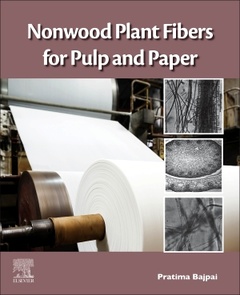Nonwood Plant Fibers for Pulp and Paper
Auteur : Bajpai Pratima

1. General background and Introduction2. Considerations for use of nonwood fiber3. Worldwide pulping capacity of nonwood fibers4. Categories of non-wood raw materials5. Problems associated with the use of nonwood fibers and how they are approached6. Handling, storage and preparation of nonwood raw materials for pulping7. Pulping properties/Pulping8. Bleaching9. Chemical recovery10. Beating/Refining Papermaking11. Use of nonwood plant fibers in specific paper and paperboard grades12. Advantages and disadvantages of using nonwood fiber for papermaking13. The Future
- Provides comprehensive coverage on all aspects of pulping and papermaking of non-wood fibers
- Covers the latest science and technology in pulping and papermaking of non-wood fibers
- Focuses on biotechnological methods, a distinguishing feature of this book and its main attraction
- Presents valuable references related to the pulp and papermaking industry
Date de parution : 01-2021
Ouvrage de 248 p.
19x23.3 cm
Thèmes de Nonwood Plant Fibers for Pulp and Paper :
Mots-clés :
Abaca; Agricultural residues; Alkaline process; Alternative recovery processes; Annual plants; Availability of nonwood fibers; Bagasse; Bamboo; Bast fibefrs; Bast fiber; Beating; Black liquor; Black liquor viscosity; Bleaching; Chemical recovery; Chipper; Cleaning; Conventional bleaching; Corn stalk; Cotton stalk; Depithing; Desilication of black liquor; Desilication of green liquor; Digesting; ECF bleaching; Enzymatic bleaching; Enzymes; Esparto; Hemp; Jute; Kenaf; Kraft method: soda method; Leaf fibers; Newsprint; Nonwood fiber; Nonwood plant fiber; Nonwood plant fibers; Nonwood pulp; Nonwood pulp production; Nonwood pulping capacity; Nonwood raw material preparation; Nonwoody annual plants; Nonwoody raw materials; Paper industry; Papermaking; Papyrus; Pile; Pollution; Printing paper; Pulp; Pulp and paper industry; Pulping; Pulping process; Pulping properties; Reed; Reeds; Refining; Sabai grass; Screening; Seed hair fibers; Silica; Sisal; Soda recovery; Specialty nonwoods; Specialty paper; Storage; Storage and handling; Straw; Sulfate method; Sulfite method; TCF bleaching; Transportation; Washing; Wheat straw; Writing paper



